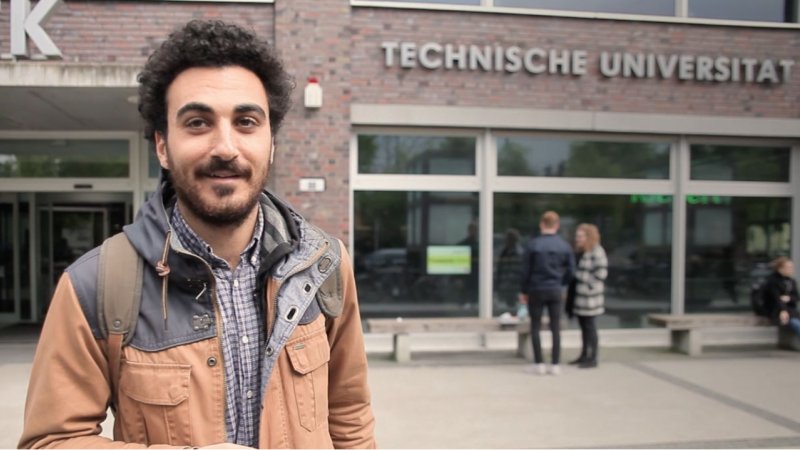
As a member state of the European Union, the German higher education system was aligned with other European countries in the course of the 2000s. This is called the “Bologna Process”. The new bachelor’s and master’s degrees have now practically replaced the diploma (“Diplom”) and former master’s degree (“Magister Artium”). However, you might still come across them because not all universities have completed the Bologna Process yet. "Diplom" and "Magister Artium"both are equivalent to the new master’s degree.
The bachelor’s degree is an undergraduate university qualification which is recognised throughout Europe and in many countries worldwide. Bachelor, "Magister Atrium" (MA) and license degree ("Diplom") are referred to as "undergraduate studies".
Unlike a master's program, you do not need an academic degree to begin an undergraduate degree. Most of the time, you have to study for three to four years to obtain a bachelor's degree. During your studies, you will learn the basics of your subject-and after successful completion you will be handed a degree: In the humanities, you will earn a Bachelor of Arts (B.A.). In science subjects, you will earn a Bachelor of Science (B.Sc.). If you study engineering, your degree will be a Bachelor of Engineering (B.Eng.). Once you have been awarded a degree, you are qualified to enter the job market at a lower level. If you want to continue your studies, you can apply for a master’s degree. You can find a list of all Bachelor progammes in Germany on studis-online.de.
The master’s degree is the second university qualification you can obtain, i.e. a “postgraduate university qualification” which you can only earn after your bachelor’s degree. In general, you will need one or two years to complete a master’s degree. During your studies, you will expand your knowledge about a given subject and will specialise in one or two fields. After successful completion of your Masters’ you will be handed a degree:In the humanities, you will earn a Master of Arts (M.A.). If you study a science subject, your degree will be a Master of Science (M.Sc.). In engineering, you will earn a Master of Engineering (M.Eng.). Once you have been awarded a degree, you are qualified to enter the job market at a higher level. You can find a list of all Masters’ progammes in Germany on studis-online.de.
Some academic subjects are not part of the bachelor’s and master’s system. If you want to become a doctor, lawyer, teacher or pharmacist, you will have to take the official state exam (“Staatsexamen”) at the end of your studies. Once you have passed all required courses, you can take the first state exam (“Erstes Staatsexamen”). If you pass, you will have to complete a professional training period in your area of work. After that, you can take the second state exam (“Zweites Staatsexamen”). If you pass, you will be allowed to carry the respective title of your profession and work in this field. State exams are subject to federal regulation. This means that you will take the same exam regardless of where in Germany you studied.
If you have already earned a master’s degree and want to pursue your academic career, you can apply to join a PhD programme. Depending on your subject, it can take two or more years to research, write and publish your dissertation. If you consider doing a PhD, you need to first find a professor (“Doktorvater” or “Doktormutter”) who is willing to accept you as a PhD student. Only once you have found a supervisor, you can apply to join a PhD programme at their university.
A dual vocational degree (“ausbildungsintegriertes duales Studium”) is a special form of degree program. It integrates studies at a higher education institution and on-the-job training in a company. Integrated dual degree courses are particularly common in the fields of business and engineering. You can find more information about them in our chapter "School-based Vocational Training".
In contrast to regular university degree programs, dual vocational degrees do not primarily focus on academic studies. In addition to the theory that is taught at a higher education institution or “Berufsakademie”, students also undergo on-the-job training at a company. This provides them with the necessary work experience that opens up excellent career opportunities. Moreover, students receive a salary like any other trainee during the time they work for their company.
Dual vocational degree programs usually last between three and five years. In most cases, the vocational part is limited to two years to make sure that there is enough time for the academic part. You can only participate in this kind of degree course if you have the required entrance qualification for German universities. The first step is to apply at a company that will be responsible for your practical training. Then you enroll for a degree course at the university your company cooperates with.
A list of dual vocational degree courses including companies that offer traineeships is available on the “Ausbildung Plus” portal. Simply enter “ausbildungsintegriertes duales Studium” in the search field. Please make sure to apply early, as these degree courses are very popular. On azubi.de you will find more information on dual vocational degrees in German language.
On hochschulkompass.de, you can search among various types of higher education institutions and degrees and have them displayed for all possible courses of study.
Here you find all the information you need about university education- specifically tailored for refugees and in several languages.
hr integrate supports job-seeking Refugees by connecting them to Human Resources Managers in different organisations.




